TW: This post talks about EDs and body dysmorphia
Let me start out by saying that I have never been what’s considered “obese”—not even close. At my heaviest, I weighed 125 lbs., which, at 5’5, is considered underweight, according to doctors and studies.
But that didn’t stop me from thinking that I was fat—nor did it convince the hundreds of thousands of young girls and women to think the same thing. Thanks to waifish models, magazine covers, and those horrid media people who publish unflattering images of celebs shaming them for having cellulite, we are conditioned from a very young age to think there is only one “perfect” type of body—a rail-thin one.
Why does this matter? Because millions of women struggle with body positivity, and that affects not only our daily mental health but also our dating lives. As cliche as it might sound, you have to love yourself before you can truly love anyone else. And while the body positivity movement has gained traction in recent years, thank goodness, it’s still a struggle to keep that frame of mind.
The Start
Now, I came of age in the early aughts, and my ideal body was supermodel Kate Moss or actress Keira Knightley. Both had teeny, tiny bodies that weren’t alarmingly skinny, but they were super thin. But this wasn’t what sparked my ED or body dysmorphia; it happened when I was 13 years old.
My mom and I were shopping in Manhattan when I was scouted by a modeling firm. Two weeks later, we were sitting with an agent at one of the biggest agencies, and after I’d been appraised and measured, the woman across the antique walnut desk said that I’d have to lose 10 lbs. before they’d consider signing me.
My mom yanked me out of that office so fast I thought she might’ve dislocated my shoulder. You see when I was 13, I weighed 80 lbs. tops; I was a late bloomer, so this was pre-puberty—no hips, flat as a board, you get the picture. As we rode the elevator 40 floors to the lobby, I asked my mom, “Am I fat?” She told me to stop being ridiculous and that if I lost 10 lbs, I would disappear.
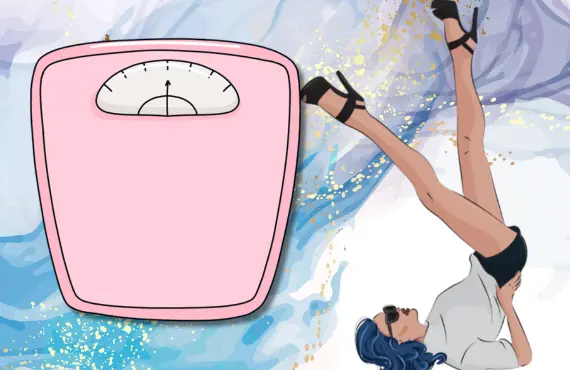
But the damage had been done. That one sentence planted a seed that grew and festered into what has been a lifelong struggle with my body image, and you’d better believe it has and continues to affect my dating and love life. While I’ve come to grips with most of my body issues, it never really goes away, but it isn’t at the forefront of my mind like it was. It remains an echo that is mostly distant, but once in a while, it reverberates around my brain on a destructive loop.
This is why body positivity is so important—learning to love yourself as you are can be hard, but it is doable.
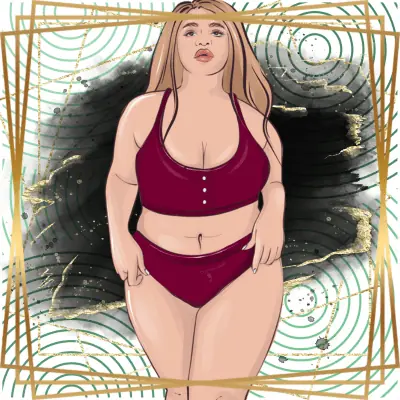
Dating With Dysmorphia
Once upon a not-so-distant past, the mirror was my foe, showing my distorted visions of my body. Living with an eating disorder (ED) and body dysmorphia, I navigated the world through a lens of self-loathing.
Dating? It seemed an impossible feat. How could anyone love me when I didn’t love myself? But little by little, with the help of therapy and a long road to semi-recovery, leaning on body positivity became the touchstone of my way back to loving myself. And trust me, it changed my dating life for the better.
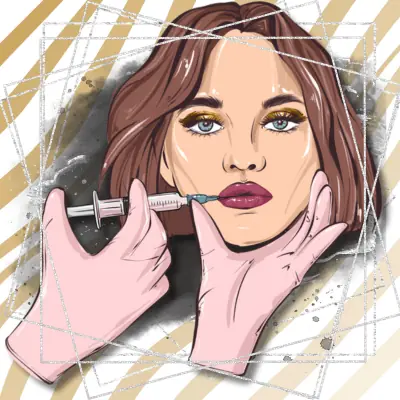
The Mirror Doesn’t Lie, But Our Perceptions Do
Body dysmorphia is a tricky imp—it deceives you into magnifying every little one of your perceived flaws and imperfections. During my darkest days, I avoided full-length mirrors like they were a plague, sure that they would confirm my worst fears about myself. I wasn’t “dateable” or worthy of love because I wasn’t what was considered “perfect.” And I was far from alone in my thinking.
Although these issues disproportionately affect women, men are certainly not immune.

Prevalence of Body Dissatisfaction
- According to a survey by Glamour Magazine, 97% of women surveyed admitted to having at least one “I hate my body” moment every day.
- A 2016 study published in the journal “JAMA Pediatrics” showed that over 50% of girls and over 30% of boys between ages 14 to 18 had used laxatives, vomiting, fasting, diet pills, or smoked cigarettes to lose weight or prevent weight gain.

Eating Disorders
The National Eating Disorders Association (NEDA) states that approximately 20 million women in the United States will have an eating disorder at some point in their lives.
According to NEDA, eating disorders have the highest mortality rate of any mental illness.

Impact of Media and Society
Research from the ‘Dove Self-Esteem Project’ shows that 8 out of 10 women opt out of important activities, such as engaging with family and friends, due to self-consciousness about their looks. The same Dove research states that 6 out of 10 girls avoid participating in life activities due to a lack of body confidence.
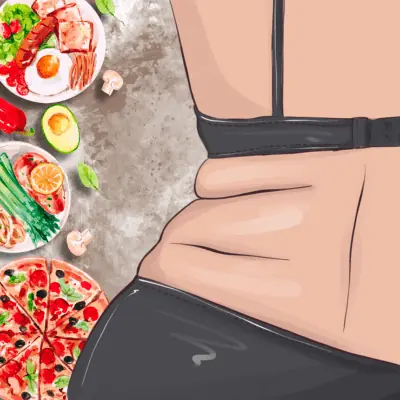
Impact on Mental Health
Studies have indicated that body dissatisfaction can lead to increased risks for mental health issues such as depression, anxiety, and low self-esteem.
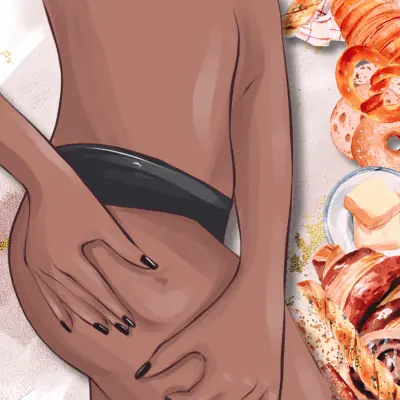
Dating and Relationships
A study from the University of North Texas found that body image dissatisfaction can impact relationship satisfaction, often leading to increased emotional distress.
Why These Statistics Matter
These numbers aren’t just numbers; they represent real women leading lives haunted by insecurity and self-doubt. Moreover, these stats highlight the pressing need for cultural change and more awareness about body positivity. Understanding how deeply ingrained these issues are in society can help us pave the way for important dialogue about body positivity and self-love, especially as they crisscross with our dating lives.
In a world where superficial metrics continually rate us, it’s almost radical to love yourself as you are. And for women navigating the dating world, breaking away from these numbers can mean a world of difference between a love life ruled by anxiety and one that is thriving.
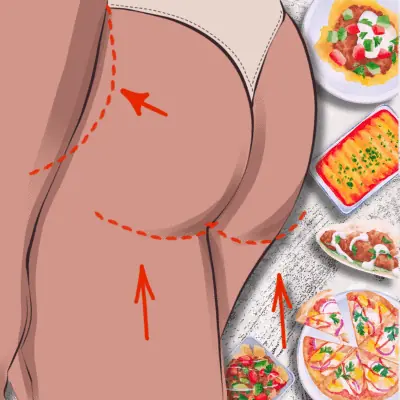

How Body Positivity Changes You
I can’t tell you the exact moment it resonated with me, and I can’t lie and say it fully clicked, but as I went through recovery, I focused more on body positivity instead of listening to that distant echo—it helped me to tune it out.
So, instead of focusing on how my body looked and could never look as it wasn’t physically possible, I tried to embrace what it could do. I was a dancer, a gymnast, a tennis player—my body could do all of these things. And if It could do them and do them well, it was worthy of being loved.

Loving Myself First
Intriguingly, this internal shift had an external ripple effect. Loving myself first made dating a different experience. I no longer sought or even wanted validation from a romantic partner; instead, I looked for companionship, mutual respect, and love—real love, not the kind wrapped in the shiny red bow of superficial physical perfection.
Once I began to accept my body for what it was, the qualities I looked for in a partner changed. Humor, kindness, and intelligence moved to the top of the list, and my previous shallow checklist that included “must have a six-pack and shredded obliques” moved to the bottom of my romantic requirements.

Body Positivity in Action
It’s easy to say you love yourself, but putting it into practice in the dating world? That’s a whole different can of worms. I started by setting hard boundaries and taking to heart the concept of consent—not just physical, but emotional and mental. This empowered me to make decisions based on what really felt right for me, not what society or my insecurities dictated. Thank you, therapy.
As I lessened my grip on self-judgment, I found that my relationships became much more meaningful. I attracted partners who loved me for me, not for who they wanted me to be. And even more remarkably, the better my self-image became, the less I put up with any kind of disrespect or mistreatment from anyone.
The most remarkable change? I realized I was worthy of love, and anything less than that was unacceptable.
Final Takeaways
Body positivity and self-love are transformative, not just for how you see yourself but for how you experience love and relationships. I learned the hard way that the trite saying is indeed true: You can’t truly love someone else until you love yourself.
I’m not going to BS you and say I’m cured, but I have more good days than bad ones. And most of the time, when I look in the mirror, I don’t just see an imperfect body; I see a woman deserving of love—both from herself and others.
Loving yourself first might sound like a tired mantra, but its weight is valuable—it’s the key to unlocking a world where your worth isn’t tied to your appearance, but to your soul. And there, you’ll find not just love but that you are entitled to be unabashedly yourself.
